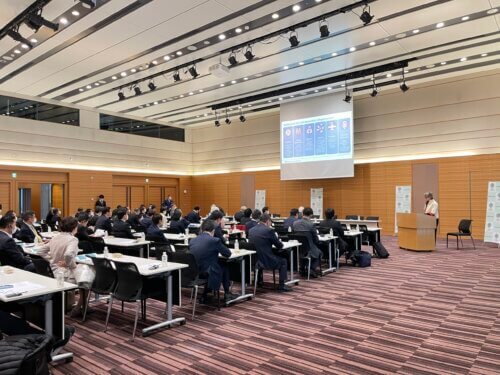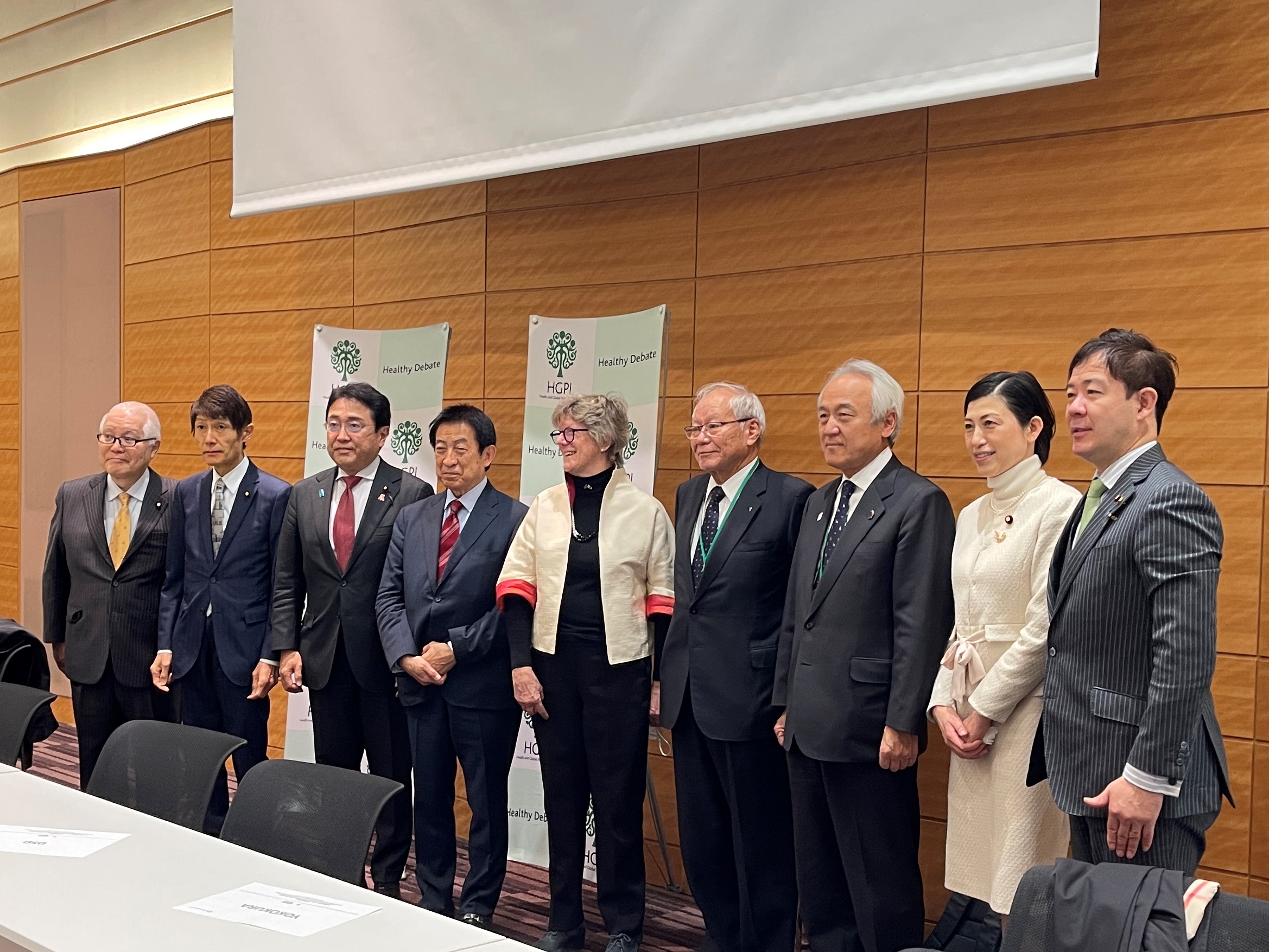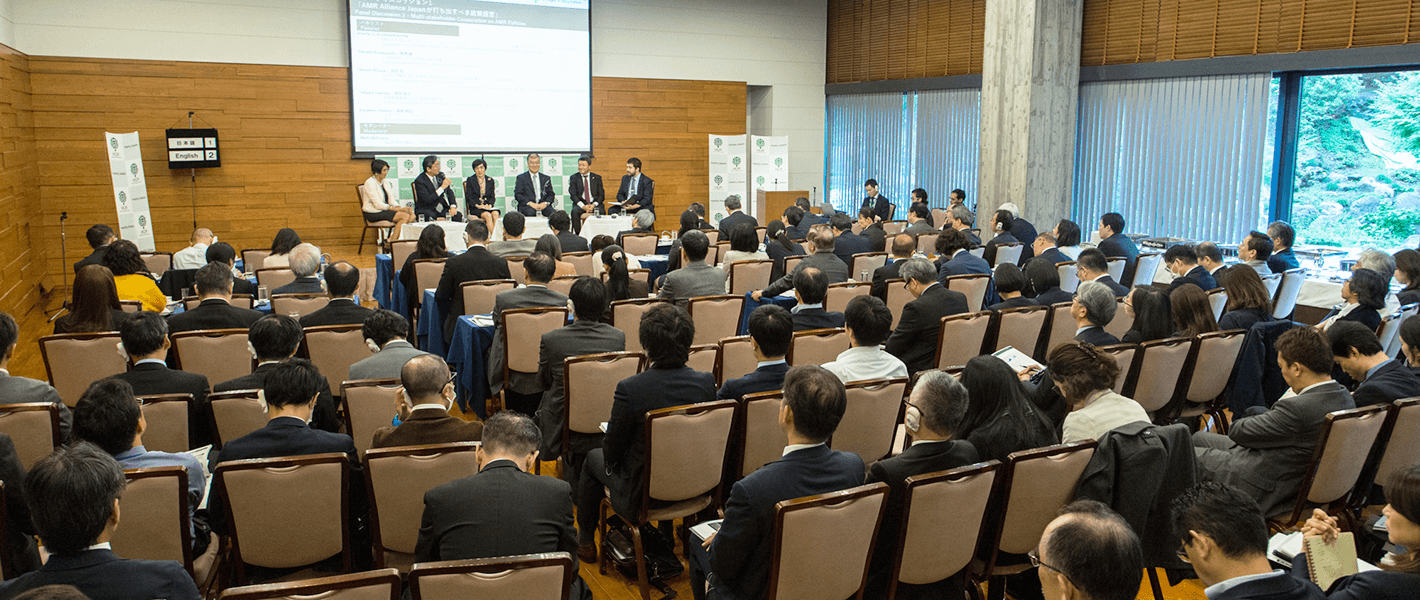[Event Report] Special Diet Member Study Session “Examining Prospects for International Collaboration on Antimicrobial Resistance (AMR) Ahead of the G7 Hiroshima Summit” (February 28, 2023)
- Home >
- Information >
- Event >
- [Event Report] Special Diet Member Study Session "Examining Prospects for International Collaboration on Antimicrobial Resistance (AMR) Ahead of the G7 Hiroshima Summit” (February 28, 2023)
 Health and Global Policy Institute (HGPI) and the Global Leaders Group on Antimicrobial Resistance, which was established by the World Health Organization (WHO) and its partners, co-hosted a study session for members of the Diet entitled “Examining Prospects for International Collaboration on Antimicrobial Resistance (AMR) Ahead of the G7 Hiroshima Summit”
Health and Global Policy Institute (HGPI) and the Global Leaders Group on Antimicrobial Resistance, which was established by the World Health Organization (WHO) and its partners, co-hosted a study session for members of the Diet entitled “Examining Prospects for International Collaboration on Antimicrobial Resistance (AMR) Ahead of the G7 Hiroshima Summit”
The study session featured a lecture from Dame Sally Davies, who has led global discussions on AMR for many years and previously served as Chief Medical Officer for England. The lecture covered a number of topics including the impact of AMR on the global economy, the importance of antimicrobial innovation, and One Health.
The lecture was followed by a lively opinion exchange session with many questions from attending Diet members.
■ Purpose
Antimicrobial resistance, or AMR, is a global menace that, according to an estimate published in a British medical journal in 2022, was the direct cause of 1.27 million deaths in 2019. AMR has been called a “silent pandemic” and “The next threat after COVID-19.” Given the lack of progress in the development of new antimicrobials, it has become necessary for us to discuss the need for global collaboration among G7 members and in the international community.
Key points of the lecture
- Antimicrobials are not only vital tools for treating infectious diseases including HIV and malaria, they are also essential for treating cancer and for safely performing various surgical procedures. However, existing antimicrobials have been growing less effective due to the emergence of new AMR bacteria and the propagation of AMR infections. It has been predicted that AMR will result in fewer treatment options within five years, even in the field of cancer. If antimicrobials become ineffective, it may lead to losses of life from dental procedures and cesarean sections.
- AMR control is also important within the frameworks of national and economic security. The manufacturing bases for the active pharmaceutical ingredients (APIs) of 40 key antimicrobials are concentrated in India and China. It has also been projected that failure to take measures to combat AMR now might cost the global economy up to $100 trillion by 2050 and cause a major reduction in GDP.
- The antimicrobial market is collapsing. We must reestablish an environment that enables new antimicrobials to be launched continuously. New classes of antimicrobials have not reached real-world clinical settings and patients since the late 1980s. In addition, the number of newly approved antimicrobials in Japan has declined by half over the past three decades. Japan has not established a mechanism for bringing antimicrobials to market.
- Countries like Japan and the U.K. have started introducing pull incentives to restructure the antimicrobial market and support innovation. Japan’s proposed FY2023 budget allocates 1.1 billion yen for pull incentives and discussions on an Antimicrobial Drug Securement Project are now advancing. To rebuild a climate in which new antimicrobials can be launched in a continuous manner, the antimicrobial market must be improved by restructuring it in a manner that makes the antimicrobial business more predictable and that allows antimicrobials manufacturers to be able to count on generating certain amounts of revenue.
- Antimicrobials are public goods, which means we must improve the structure of the antimicrobial market through measures based on global collaboration, including the introduction of pull incentives, as well as by implementing measures for AMR control based on the One Health approach. As the President of the G7 Hiroshima Summit in 2023, expectations are high for leadership from Japan when advancing measures to combat AMR.
[Program] (interpretation was provided for all items, title omitted)
Opening remarks
Yasuhisa Shiozaki (Member of the Global Leaders Group on Antimicrobial Resistance / Former Minister of Health, Labor and Welfare)
Greetings
Keizo Takemi (Member, House of Councillors / Japanese Co-Chairman, UK-Japan 21st Century Group)
Yoshitake Yokokura (Honorary President, Japan Medical Association)
Isao Kurauchi (President, Japan Veterinary Medical Association)
Lecture “Prospects for International Partnership on AMR issues in the G7 Countries”
Dame Sally Davies (Former Chief Medical Advisor to the UK Government / UK Government Special Envoy on Antimicrobial Resistance / Member of the Global Leaders Group on Antimicrobial Resistance)
Question and answer session



